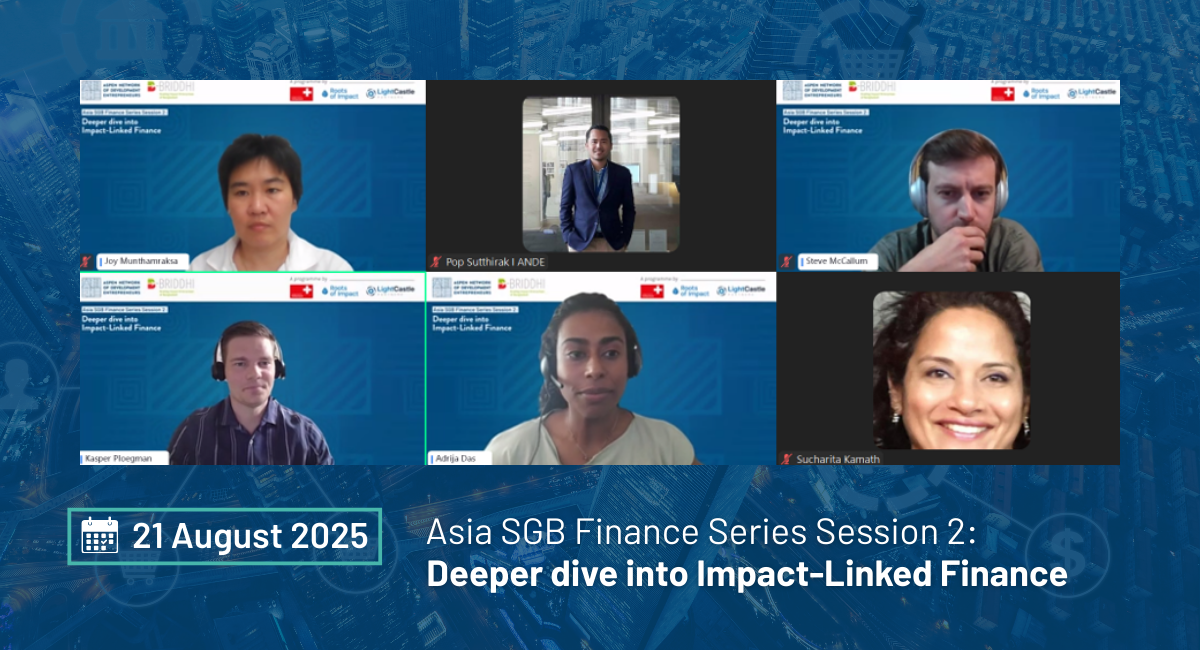What if financial rewards could be directly tied to the social impact you create?
ANDE Asia partnered with Roots of Impact to explore this game-changing question in the second session of the SGB Finance Series, taking a deep dive into Impact-Linked Finance (ILF), the revolutionary approach transforming how we fund social good. Moving beyond theory from their earlier introductory session, this power-packed discussion revealed battle-tested lessons distilled from over eight years of real-world ILF implementation spanning continents and sectors, offering actionable insights for anyone ready to make their financing as impactful as their mission.

What is Impact-Linked Finance?
ILF asks a simple question: what kind of finance do enterprises actually need to scale their impact sustainably?
The model rewards companies for achieving measurable social outcomes — for example, reducing loan interest rates when gender equity targets are met, or providing cash incentives when water utilities connect more underserved households.
The principle is clear: better terms for better impact.
Roots of Impact shared powerful lessons distilled from their global portfolio:
Alignment
Successful ILF implementation requires strong strategic alignment at multiple levels. Incentives must build on an enterprise’s mission to avoid distorting priorities, ensuring that financial rewards complement rather than compete with core organizational objectives. Equally important is following clear design principles where rewards must flow to enterprises (not investors) and be tied to verified outcomes. A forthcoming ILF Assessment Tool will help ensure quality implementation of these foundational alignment principles.
Adaptability
ILF’s strength lies in its remarkable flexibility across contexts and enterprise stages. Diverse use cases expand ILF’s reach, from scaling commercially strong companies to incentivizing new impact themes like gender or climate, demonstrating that ILF structures are highly adaptable. This adaptability extends to enterprise maturity levels, where early-stage enterprises can benefit from models like the Impact Ready Matching Fund (IRMF), which pairs capacity building with financing. This Impact Ready Matching Fund is non-repayable funding that rewards enterprises for elevating their IMM capacities. Above all, flexibility is essential as incentive schemes must adapt to evolving contexts and enterprise realities over time.
Technical Support
Effective ILF implementation recognizes that financial incentives alone are insufficient for sustainable impact delivery. The greater the impact variance, the more ILF is needed, particularly where outcomes are unpredictable (e.g., health, education, microfinance), as linking finance to verified results ensures impact stays on track. This approach must be reinforced by combining incentives with technical assistance, since cash alone isn’t enough; capacity support strengthens enterprises’ ability to deliver sustainable outcomes over the long term.
Scalability
Strategic focus and specialization drive ILF’s scalability potential. Sector- and theme-specific funds accelerate learning by creating targeted approaches — in education, gender-inclusive fintech, or Water, Sanitation, and Hygiene (WASH) — that allow for better benchmarks and efficient structuring. This specialized approach enables more effective scaling by building concentrated expertise and refined implementation models within specific impact areas.
What’s Next for ILF?
Roots of Impact previewed their upcoming Transaction Hub — a digital platform offering tools, templates, and methodologies to support practitioners in structuring ILF deals. This resource aims to make ILF more accessible and scalable for funders and enterprises worldwide.
Closing Thoughts
The session reaffirmed that ILF is no longer just a niche experiment. It’s a rapidly growing practice, drawing attention from large funders and increasingly shaping the future of blended and innovative finance.
At ANDE, we remain committed to convening conversations that push the boundaries of access to finance for small and growing businesses. If your organization is interested in partnering with us on this journey, please reach out.
Join us for future sessions in the SGB Finance Learning Series.
